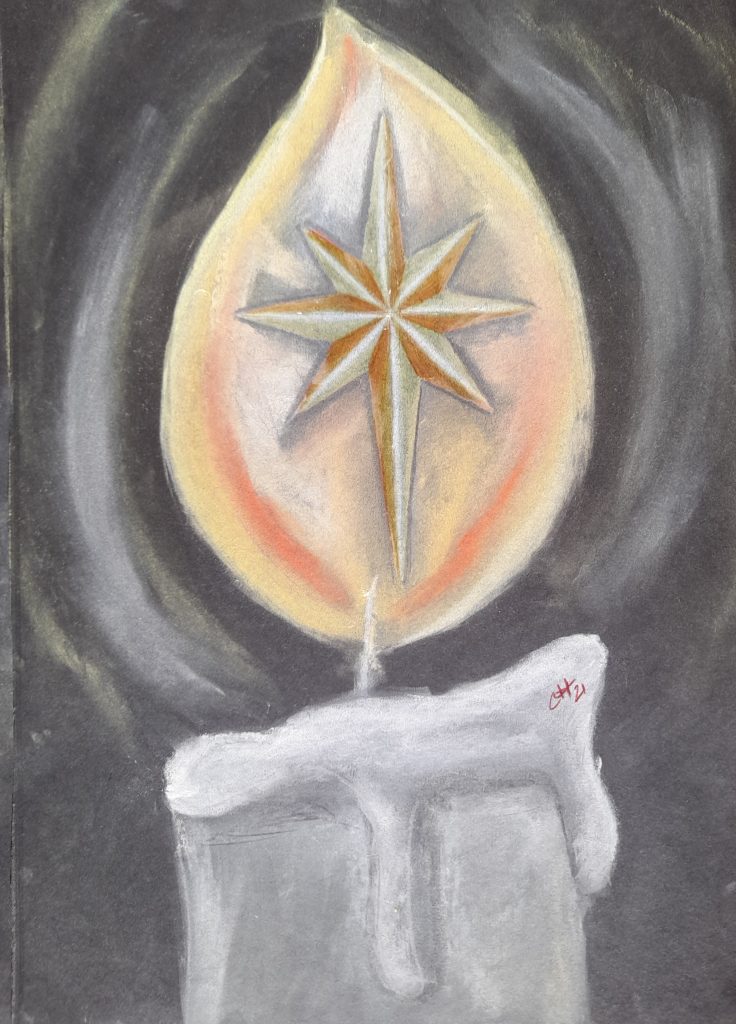We are delighted to have Karenza Mahtani write a series of Advent reflections for us over the next few weeks. Karenza is part of the Accessible Prophecy UK team. Art work is by Carolyn Higgins, another member of the team.
Over these Advent weeks, we will be following a similar pattern to the traditional Advent wreath – 5 candles, 5 opportunities to reflect on different parts of the story. What each of these candles represents tends to vary across theological and ecclesiastical traditions, but each representation offers a fresh moment to pause and connect with God. I encourage you to take these moments as we move through this season.
“The people walking in darkness have seen a great light; a light has dawned on those living in the land of darkness… For a child will be born for us, a son will be given to us, and the government will be on his shoulders. He will be named Wonderful Counsellor, Mighty God, Eternal Father, Prince of Peace. The dominion will be vast, and its prosperity will never end. He will reign on the throne of David and over his kingdom, to establish and sustain it with justice and righteousness from now on and forever. The zeal of the Lord of Armies will accomplish this.” Isaiah 9 v 1 -7
“Then a shoot will grow from the stump of Jesse, and a branch from his roots will bear fruit. The Spirit of the Lord will rest on him – a Spirit of wisdom and understanding, a Spirit of counsel and strength, a Spirit of knowledge and of the fear of the Lord…he will judge the poor righteously and execute justice for the oppressed of the land…The wolf will dwell with the lamb, and the leopard will lie down with the goat. The calf, the young lion, and the fattened calf will be together, and a child will lead them. The cow and the bear will graze, their young ones will lie down together, and the lion will eat straw like cattle. An infant will play beside the cobra’s pit, and a toddler will put his hand into a snake’s den. They will not harm or destroy each other on my entire holy mountain for the land will be as full of the knowledge of the Lord as the sea is filled with water.” Isaiah 11 v 1 – 9

In the Old Testament, there is an ongoing set of prophetic promises and revelations about the coming Messiah: where he would be born (Micah 5 v 2), what his early life would be like (Hosea 11 v 1), as well as many other prophecies borne out and fulfilled in the accounts of the New Testament. This mirrors much of the historical lineage of promises that we reflected on last week in terms of that first advent candle in the CofE tradition that acknowledges the patriarchs. However, we see this take on a new urgency with the prophets as they long for the coming Messiah, the one who will restore all things. The prophet Isaiah speaks in the above chapters of one who will reign with justice and righteousness, in a kingdom where the strong do not destroy the weak, but instead there is equality and love between them and oppression ceases. As the story of the people of God continues, the prophets continue to speak of this coming King, as well as attempting to call God’s people back to him. However, they witness the people of God splinter, be exiled, fall away, forget about what God has done for them, get distracted and ultimately, despite many returns and short-lived repentances, the story of the Old Testament ends with a period often termed the 400 years of silence. Just waiting. No Messiah in sight.
What must it have been like to be a person aware of the history, longing for the coming of the Messiah, but never seeing it realised? It reminds us of that oft cited line from the Lion, the Witch and the Wardrobe – where it is always winter, never Christmas. Those who lived in the darkness, as Isaiah puts it, but who did not see that great light. Those who saw the land repeatedly overrun by the great empires of the day, culminating in the Roman invasion.
How did the people cope? By the beginning of the New Testament, we see that some have retreated into the desert, some have turned to laws and religion and predictable patterns whilst finding others to blame, some have turned to human solutions, political ambition and violence in their ambition to overcome the darkness and oppression around them, whilst others have simply given up. I wonder where you see yourself in that. How do we respond when we are in these long periods of waiting? What disappointments are we carrying? Things you know have been promised, things you have prayed for and not yet seen. Are we one of the faithful remnant, waiting patiently and holding fast to what has been spoken, or have we found ourselves on a different path?
Advent is a time of hope and expectation, but it is also a time of lament and yearning. It is certainly a time of tension between the two – Christmas is coming but not yet. Jesus is coming but not yet. Even in our time, where we know how the prophecies were fulfilled in the birth of Christ, we also know that he has promised to return. There is an ancient Antiphon used during Advent – O Oriens – that says: “O Morning Star, splendour of light eternal and sun of righteousness: Come and enlighten those who dwell in darkness and the shadow of death.” This prayer speaks to the tension we all live in. The now and the not yet. The recognising what has come and longing for what is still to come. Jesus has come and will come again. The Kingdom is here, but is coming more. His justice and righteousness have been established, but one day will be brought to completion.
And so, we are waiting for him to come again. We yearn and pray into the night for his return. We wait with our oil burning, with hearts prepared for Emmanuel to return and set things right. One day, he will wipe away every tear, even though that hasn’t happened fully yet. What a promise to hold on to! But also, when we look at our lives and the world around us, what impatience and grief we can feel that it hasn’t happened yet. We have areas and periods of our lives where we are waiting for certain things -some small, others the deepest desires of our hearts. And we know from Proverbs 13 that hope delayed makes the heart sick. Living with disappointment, asking God how much longer, puts us in great company with all those throughout the Bible and throughout history who receive the promises of God, faithfully believing that they will come to pass, and yet for whom most, if not all, of their lives are spent waiting to see them fulfilled.
I encourage you this Advent to lean into the discomfort of this tension. To celebrate and thank God for all he has done, the promises and words you have seen him fulfil; to celebrate Jesus and make way for more of what he has done and is doing in your life and the lives of those around you. Desire fulfilled is a tree of life. But also, to be honest with God about areas of pain and disappointment, to lament and weep and yearn, to ask God to strengthen your hope and to heal your heart as you wait for Him. Spend some time, listening to the carol, reading the Scriptures, considering the image – whatever works for you- asking God to show those places of disappointment and let Him meet you. And remember that you are joined by the whole of history—patriarchs, prophets and ordinary people—who have longed for the arrival of Jesus into the world and into their lives. Let our cry this Advent be O Come, O Come Emmanuel, and let us be ready to receive him.

